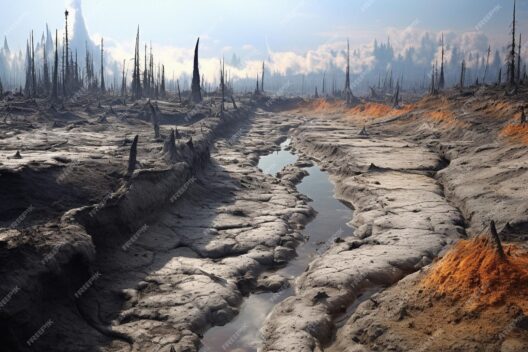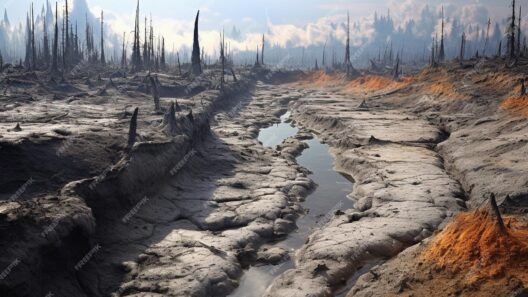Marine life, a vibrant tapestry of interconnected ecosystems, is facing unprecedented threats as global warming accelerates. The oceans, often regarded as the lungs of our planet, play a critical role in regulating climate and supporting countless species. However, the rising temperatures and resultant environmental shifts herald a concerning reality for our marine companions. This article delves into the multifaceted impacts of global warming on marine life, illustrating both the immediacy and the profundity of these changes.
The phenomenon of global warming, driven primarily by human-induced greenhouse gas emissions, leads to a cascade of transformations within marine environments. One visible manifestation is ocean warming. As atmospheric temperatures rise, it follows that oceans absorb much of this excess heat. A mere increase of 1 to 2 degrees Celsius can be catastrophic for marine organisms, particularly those dependent on stable thermal conditions. Coral reefs, often dubbed the rainforests of the sea, epitomize this vulnerability. They are not just stunningly beautiful; they serve as essential habitats for myriad species. Rising sea temperatures induce coral bleaching, wherein corals expel the symbiotic algae, zooxanthellae, that provide them with nutrients and color. The stark white bleached corals are not merely an aesthetic loss; they signify a breakdown in the entire ecosystem, leading to diminished biodiversity.
Acidification presents another severe threat that arises from increased carbon dioxide levels. The oceans absorb roughly a quarter of the CO2 emitted into the atmosphere, leading to lower pH levels. This acidification disrupts the calcification processes essential for shellfish, mollusks, and coral growth. As the water becomes more acidic, organisms reliant on calcium carbonate face insurmountable challenges. For instance, oyster and clam populations are declining, impacting both marine ecosystems and local economies dependent on fishing. Additionally, this shift in chemical balances disrupts the food web, as smaller organisms that form its base are affected.
Aside from these immediate biomechanical challenges, the shifting climate patterns affect marine species’ migration behaviors and reproductive cycles. Many fish species have begun migrating towards cooler waters, which can lead to overfishing in traditionally abundant areas while leaving previous fishing grounds barren. The resultant change in fish populations can also have far-reaching effects on predator-prey dynamics, thus altering the entire marine food web. Predators may struggle to find food, while herbivores could overpopulate their environment, leading to further imbalances.
A particular species that has become emblematic of these challenges is the Atlantic cod. Once abundant off the coast of North America, their populations have plummeted due to overfishing and now face additional stresses related to climate change. As sea temperatures rise, they are forced to migrate northward, where they encounter new environmental pressures and compete with resident species. Fisheries must adapt to these shifts, often struggling to maintain sustainably managed stocks. The ramifications extend beyond ecological concerns, impacting the livelihoods of fishing communities and the cultural heritage associated with fishing traditions.
The narrative of marine biodiversity loss cannot be fully told without acknowledging the crucial role of marine protected areas (MPAs). These regions are designated to conserve marine ecosystems, providing a sanctuary for species to thrive amidst external pressures. However, as global warming continues to shift the parameters of marine environments, the effectiveness of MPAs is called into question. Species may be forced to relocate beyond the confined boundaries of these areas, making static protections insufficient in a rapidly changing world. Adaptive management strategies that consider the dynamic nature of marine resources are imperative to ensure the survival of vulnerable species.
The phenomenon of global warming and its effects on marine life extends beyond ecological dimensions; it influences human health and economies worldwide. Communities reliant on marine resources for their sustenance and livelihood find themselves on precarious ground as fish populations dwindle. The loss of food security, as well as the collapse of fisheries, can erode local economies, leading to broader socio-economic crises. Furthermore, the rise in sea temperatures has been linked to harmful algal blooms, which pose significant health risks to both humans and marine animals. These blooms can produce toxins that lead to sickness in coastal populations and decimate local marine life.
Addressing these looming challenges necessitates global cooperation and concerted efforts. The international community must recognize the interconnectedness of marine health and humanity’s overall well-being. Effective strategies must incorporate science-based policies aimed at reducing greenhouse gas emissions, fostering sustainable fishing practices, and enhancing marine conservation efforts. Education and community engagement can also galvanize public support for actions that prioritize the protection of our oceans.
In conclusion, marine life stands on the precipice of substantial upheaval due to the insidious effects of global warming. The interconnectedness of ecosystems, species, and human communities underscores a pressing need for immediate action. By recognizing the complexities of these environmental changes, humanity can begin to forge pathways toward a more sustainable coexistence with our oceans and the myriad forms of life they encompass. The call to action is urgent; the time to heed the warning signs and advocate for the protection of our marine ecosystems is now. The health of our oceans, and by extension our planet, depends on a collective commitment to safeguarding these irreplaceable resources. Only then can we hope to preserve the marine biodiversity that enriches our world and sustains our future.






